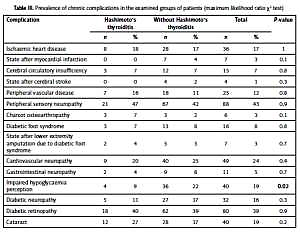Current issue
Archive
Manuscripts accepted
About the Journal
Editorial office
Editorial board
Section Editors
Abstracting and indexing
Subscription
Contact
Ethical standards and procedures
Most read articles
Instructions for authors
Article Processing Charge (APC)
Regulations of paying article processing charge (APC)
ENDOCRINOLOGY / CLINICAL RESEARCH
Does concomitance of Hashimoto’s disease and type 1 diabetes affect diabetes control and development of its complications?
1
Department of Diabetology, Institute of Rural Health, Lublin, Poland
Submission date: 2018-02-18
Final revision date: 2018-06-22
Acceptance date: 2018-07-07
Online publication date: 2019-11-16
Publication date: 2021-07-16
Arch Med Sci 2021;17(4):900-904
KEYWORDS
TOPICS
ABSTRACT
Introduction:
Autoimmune diseases concomitant with diabetes may complicate the treatment and adversely affect the prognosis. The most common is Hashimoto’s disease (HD). We compared diabetes control and prevalence of chronic complications in type 1 diabetes patients differing in the coexistence of HD.
Material and methods:
Medical records of 188 type 1 diabetics were analysed. Hashimoto’s disease was diagnosed based on medical history, as well as determination of the levels of thyroid peroxidase antibodies, hormones and ultrasound exa¬mination. Statistical analysis was performed using Statistica 10PL.
Results:
HD was diagnosed in 43 patients (23%). The mean HbA1c was 8.8 ±1.5% in the group with HD, and 9 ±1.6% in the group without HD (ns). The prevalence of diabetes complications was similar in both groups: ischae¬mic heart disease was diagnosed in 19% of patients with HD and 19% without HD, cerebral vascular insufficiency – 8% and 7%, peripheral neuropathy – 14% and 12%, sensory polyneuropathy – 47% and 46%, diabetic foot – 7% and 8%, Charcot osteoarthropathy – 7% and 2%, cardiovascular neuropathy – 21% and 28%, neuropathy of the gastrointestinal tract – 5% and 6%, nephropathy – 12% and 19%, retinopathy – 42% and 43%, and cataract in 28% and 19%, respectively. Impaired hypoglycaemia perception was rarer in the group with HD: 9% vs. 25% (p ≈0.04).
Conclusions:
Hashimoto’s disease does not significantly affect the level of type 1 diabetes control or the development of its complications. Only autonomic neuropathy in the form of impaired awareness of hypoglycaemia is rarer in patients with that thyroiditis.
Autoimmune diseases concomitant with diabetes may complicate the treatment and adversely affect the prognosis. The most common is Hashimoto’s disease (HD). We compared diabetes control and prevalence of chronic complications in type 1 diabetes patients differing in the coexistence of HD.
Material and methods:
Medical records of 188 type 1 diabetics were analysed. Hashimoto’s disease was diagnosed based on medical history, as well as determination of the levels of thyroid peroxidase antibodies, hormones and ultrasound exa¬mination. Statistical analysis was performed using Statistica 10PL.
Results:
HD was diagnosed in 43 patients (23%). The mean HbA1c was 8.8 ±1.5% in the group with HD, and 9 ±1.6% in the group without HD (ns). The prevalence of diabetes complications was similar in both groups: ischae¬mic heart disease was diagnosed in 19% of patients with HD and 19% without HD, cerebral vascular insufficiency – 8% and 7%, peripheral neuropathy – 14% and 12%, sensory polyneuropathy – 47% and 46%, diabetic foot – 7% and 8%, Charcot osteoarthropathy – 7% and 2%, cardiovascular neuropathy – 21% and 28%, neuropathy of the gastrointestinal tract – 5% and 6%, nephropathy – 12% and 19%, retinopathy – 42% and 43%, and cataract in 28% and 19%, respectively. Impaired hypoglycaemia perception was rarer in the group with HD: 9% vs. 25% (p ≈0.04).
Conclusions:
Hashimoto’s disease does not significantly affect the level of type 1 diabetes control or the development of its complications. Only autonomic neuropathy in the form of impaired awareness of hypoglycaemia is rarer in patients with that thyroiditis.
Share
RELATED ARTICLE
We process personal data collected when visiting the website. The function of obtaining information about users and their behavior is carried out by voluntarily entered information in forms and saving cookies in end devices. Data, including cookies, are used to provide services, improve the user experience and to analyze the traffic in accordance with the Privacy policy. Data are also collected and processed by Google Analytics tool (more).
You can change cookies settings in your browser. Restricted use of cookies in the browser configuration may affect some functionalities of the website.
You can change cookies settings in your browser. Restricted use of cookies in the browser configuration may affect some functionalities of the website.



